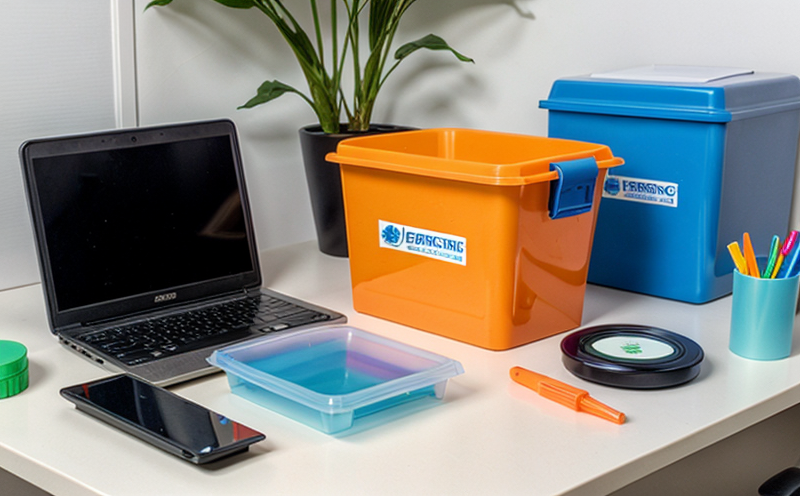EN 1186 Migration Testing for Food Contact Office Plastic Containers
The European Standard EN 1186:2021 outlines the requirements and test methods for plastic containers intended to come into contact with food, including office-use plastics. This standard is crucial in ensuring that materials used in packaging do not leach harmful chemicals into foods or beverages during storage or use.
The testing process involves simulating real-world conditions under which the container would be used. For instance, the plastic containers are subjected to immersion in different solvents and temperatures that mimic potential exposure scenarios. The primary aim is to detect any migration of additives, stabilizers, antioxidants, or other compounds into food contact surfaces.
This service ensures compliance with international standards such as EN 1186:2021, providing peace of mind for manufacturers who wish to demonstrate the safety and quality of their products. Our laboratory adheres strictly to ISO/IEC 17025 accreditation requirements, guaranteeing accurate results that can be trusted by all stakeholders.
The testing procedure typically begins with thorough preparation of samples according to specified dimensions outlined in EN 1186:2021. Following this step, the containers are exposed to various solvents like ethanol and water at specific temperatures and durations. After removal from the solvent bath, they undergo rigorous analysis to identify any potential migration into the food contact surface.
The analytical methods used include infrared spectroscopy (FTIR), gas chromatography mass spectrometry (GC-MS), and liquid chromatography coupled with tandem mass spectrometry (LC-MS/MS). These advanced techniques allow for precise quantification of even trace amounts of migrating substances. The results are then interpreted against the limits prescribed by EN 1186:2021 to determine whether the container meets regulatory requirements.
Our team of experienced scientists ensures that every aspect of the testing process adheres strictly to both local and international standards, providing reliable data that can be used for internal quality control purposes or submitted as part of a certification application. By partnering with us, you can ensure your products meet stringent safety benchmarks while also complying with relevant regulations.
Real-world applications of this testing include validating the use of certain plastics in manufacturing office supplies like ink cartridges, laminated folders, and other items that may eventually come into contact with food or beverage containers. Ensuring compliance with EN 1186:2021 helps manufacturers avoid costly recalls and legal issues while enhancing brand reputation.
By investing in comprehensive testing services early on, companies can protect themselves against future risks associated with non-compliance. Our laboratory offers a range of other related services including biodegradability assessments and recyclability evaluations which complement the EN 1186:2021 migration tests already offered here.
Our commitment to excellence extends beyond just meeting standards; we strive to exceed expectations by delivering accurate, timely results that help our clients stay ahead of industry trends. With state-of-the-art facilities and skilled personnel, we are well-equipped to handle all aspects of plastic container testing required under EN 1186:2021.
Customer Impact and Satisfaction
Implementing EN 1186 migration testing is essential for maintaining customer trust and satisfaction. In a competitive market, ensuring product safety and quality is paramount. By demonstrating adherence to international standards such as EN 1186:2021, manufacturers can build confidence among consumers who value health and safety above all else.
- Enhanced Reputation: Compliance with these stringent regulations enhances the reputation of your brand in the eyes of both consumers and regulatory bodies alike. This recognition translates into increased market share and customer loyalty.
- Avoidance of Legal Issues: Non-compliance can lead to costly lawsuits, fines, or even product recalls. By conducting thorough migration testing early on, companies avoid these pitfalls altogether.
- Improved Product Quality: Regular testing helps identify potential issues before they become major problems, allowing for timely corrections and improvements in manufacturing processes.
The results of our EN 1186:2021 migration tests provide clear evidence that your products meet or exceed required safety standards. This transparency fosters trust between you and your customers, leading to long-term business relationships built on reliability and integrity.
Environmental and Sustainability Contributions
In addition to ensuring food safety, EN 1186:2021 migration testing also plays a crucial role in promoting environmental sustainability. By identifying harmful substances that might migrate into contact with food, this standard helps reduce the risk of pollution caused by discarded plastic containers.
The process encourages manufacturers to select safer alternatives or reformulate their products using less hazardous materials. This shift towards more sustainable practices not only protects public health but also contributes positively to environmental conservation efforts globally.
Our laboratory supports these goals through its commitment to eco-friendly testing methods and facilities designed with sustainability in mind. We collaborate closely with clients to develop innovative solutions that minimize waste while maximizing efficiency throughout the entire lifecycle of plastic containers.
Competitive Advantage and Market Impact
- Differentiation: By offering EN 1186:2021 migration testing, you differentiate your company from competitors who may not prioritize compliance with international standards.
- Consumer Trust: Customers today are increasingly concerned about the safety of products they use. Providing proof that your containers meet strict regulatory requirements can significantly boost consumer trust and loyalty.
- Better Reputation: Companies that demonstrate a strong commitment to quality and safety tend to enjoy better reputations within their industries, which translates into improved brand recognition and reputation management.
The ability to provide detailed reports on migration levels of various substances helps manufacturers make informed decisions about raw materials selection and process optimization. This proactive approach sets you apart as a leader in your field, positioning yourself as an innovator rather than just another player following basic industry practices.
Moreover, adhering strictly to EN 1186:2021 ensures that your products are not only safe but also compliant with global regulations. This means you can confidently expand into new markets without worrying about regulatory hurdles or safety concerns. In today's interconnected world, this flexibility is invaluable for businesses looking to grow and succeed.





